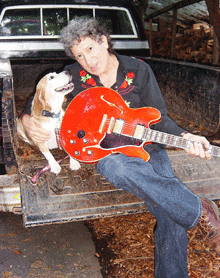Elvin Bishop is best known for his 1976 hit "Fooled Around and Fell in Love," a sweetly romantic song with a slide-guitar hook that replaced "Stairway to Heaven" as the closing number at your parents’ high-school dances — or maybe your own. He recorded four more albums with his Elvin Bishop Group after that, but as the ’80s began, he became a footnote in pop history.
 That’s okay with Bishop (who plays Scullers January 18), because by then he was already a legend in the blues world as a charter member of the Paul Butterfield Blues Band. When he says, "We introduced blues to the white public at large," he isn’t exaggerating. The Butterfield band’s first three albums, including the raga-inspired psychedelic touchstone East-West (Elektra), fueled the passions of a young audience by making the sound of Chicago part of their own musical vocabulary. And the group’s 1965 debut fired the imaginations of Eric Clapton and a host of other white musicians who were just beginning to find their way in a style that Bishop, harmonica player and frontman Butterfield, and the guitarist Michael Bloomfield had already absorbed from Muddy Waters, Big Joe Williams, and the other Windy City masters who were their mentors and neighbors.
That’s okay with Bishop (who plays Scullers January 18), because by then he was already a legend in the blues world as a charter member of the Paul Butterfield Blues Band. When he says, "We introduced blues to the white public at large," he isn’t exaggerating. The Butterfield band’s first three albums, including the raga-inspired psychedelic touchstone East-West (Elektra), fueled the passions of a young audience by making the sound of Chicago part of their own musical vocabulary. And the group’s 1965 debut fired the imaginations of Eric Clapton and a host of other white musicians who were just beginning to find their way in a style that Bishop, harmonica player and frontman Butterfield, and the guitarist Michael Bloomfield had already absorbed from Muddy Waters, Big Joe Williams, and the other Windy City masters who were their mentors and neighbors.
Now Bishop has a new album called Gettin’ My Groove Back (Blind Pig), and the title’s literal. The disc is his first in seven years that were colored by the murder of his daughter Selina in 2000. He’d already re-emerged as a bluesman with 1990’s Big Fun (Alligator) and was recording the album that would become Gettin’ My Groove Back when that tragedy slammed into his life.
"That’s why the songs have such a wide emotional range," he says over the phone from his Northern California home. "I recorded these songs before, after, and during the time I was trying to absorb that." The slow, broilingly passionate solo contemplation "Come On Blues" captures psychic torture in his moaning voice and the dark, fingerpicked rumble of his guitar. And the tumbling cadence of "What the Hell Is Going On" underscores Bishop’s confusion over the bloody state of the human condition while raising a juke-joint ruckus that fans of Junior Kimbrough would dig. The CD is also lightened by the humor that’s been his trademark. "Ride That Blues Train" celebrates greasy down-home culture with New Orleans piano giant Henry Butler guesting, and there’s a homage to Bishop’s beagle Kirby, "He’s a Dog," that sounds like an update of the string-band style of the 1920s and early ’30s.
"The album’s the result of my doing whatever I felt like at the time, which has pretty much been my career strategy," Bishop says. That’s what first led him from Tulsa to Chicago. "I went there to go to college — at least that was my cover story — in 1961, and on my first day I saw a white guy sitting on steps playing blues on guitar and drinking a quart of beer. That was Paul Butterfield, and we fell right in together. I still have him to thank for keeping me out of day jobs for 40 years or so."